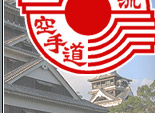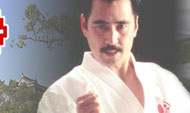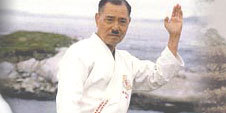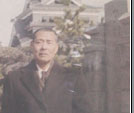What is Shugyo?
The following essay is published in whole without change and with permission from the author. It has been published in the hope that all students of Chito-Ryu (or budo in general) will continue to develop a well rounded study of the martial arts. Please note that this while this essay is while well researched and well presented, it represents an assimilation of the author's learning up to this point in his development. This essay was written as part of a 2nd kyu grading test.
Author - Craig Cox (2004) - Tasseikan dojo, Oatley, NSW, Australia
What is this concept we refer to as "Shugyou" ? Within the context of the martial arts, constant reference is made toward it, yet how many of us stop to consider its relevance and all that it implies? As practitioners of Chito Ryu karate, we recite the word glibly each night as part of the Showa ( 唱和 ) ceremony to finish training, generally, giving it little more regard than that it serves a mere function in formality. By the conclusion of this paper we shall come to recognise the massive underestimation of shugyou and the relevance of it to every living one of us.
Shugyou is commonly translated to mean "study " in English, however, this oversimplified definition suffers a distinctly Western loading, as we shall see. Such oversimplification is a direct result of the frequent misconception that for all lexis and expression within a foreign language, a literally direct match also exists within one's native tongue. As martial artists, we regularly encounter Japanese expressions that have highly specialised definitions or culturally specific applications. Despite this, very few individuals question whether or not equivalent expressions exist within our own language to communicate effectively the intended meaning of the original. Actually, the vast majority are unaware that such incongruence exists between languages. Such being the case, it is extremely relevant, even necessary that in order to progress in our martial studies, we are mindful of the importance to fully appreciate the full range of connotation one may apply to these extremely interesting expressions.
Shugyo ( 修業 ) exists in Japanese as an idiomatic compound expression, that is, it is a word composed of two or more Chinese characters. Let us first investigate fully the meaning of each component character in order to begin to understand the meaning of shugyo;
The character, Shu 修, means broadly:
... to govern oneself, conduct oneself well, study, complete (a course); cultivate; master; order (one's life); repair. (1)
Whilst the character Gyo 業, denotes:
... vocation, occupation, business, trade, profession; industry; undertaking; studies; arts; conduct; act, service; achievement.
Interestingly, the same character can also be read as Go , meaning karma . Alternatively, the reading Waza also exists, meaning:
...deed, act, work, performance, trick. (2)
With the range of possible definitions applicable to each character, one soon recognises the degree of inadequacy of the unsophisticated term study when applied to shugyo.
To the martial artist native speaker of Japanese, shugyo has far deeper resonance than study suggests. For example, the renowned "father of modern karate-do", Gichin Funakoshi was known to venture outside to take advantage of typhoons for training purposes, typhoons that are noted for being particularly ferocious around his island home of Okinawa. Tales have it that whilst holding a tatami mat to create resistance to the howling winds, Funakoshi would test the strength of his stances upon the rooftops. (3) The significance of this tale to our discussion of shugyo is not the perceived eccentricity of Funakoshi and his peculiar penchant for training in extremes of weather. Rather, the tale illustrates well, the ability for a determined mind to employ any circumstance to further an understanding of the true nature of that which is being studied, the way of karate in our case.
Chito Ryu Karate founder Tsuyoshi Chitose, known reverently as O'sensei, was himself was required by his first teacher, Arakaki, to study the same kata (a standard routine of karate techniques), Seisan , for seven years before being introduced to another. Those unfamiliar with shugyo will doubtless be impressed by the depth of commitment and concentration displayed by O'sensei, a level of dedication rarely seen even in adults whilst at the mere age of seven. This last comment at first glance may be misleading in that it appears to make light of the efforts and achievements of the young O'sensei. Please consider momentarily the alternate proposition that O'sensei, Funakoshi and the multitudes of martial arts immortals not referred to here were in fact NOT inherently special.
Consider, instead, that all of the individuals above were ordinary people, the same as everybody else in every aspect besides obvious personal circumstances (language, nationality and the like). It would then follow logically that ANY other person could repeat their feats. Indeed with the right mindset it should be understood not only could any person repeat their feats, but in fact build upon them. Actually, the only thing separating such perceived greatness from the masses is hard work and an unfailing belief in the fact that the goal will be achieved. The important point to consider here is that one need not focus upon the glorified achievement of such individuals, for to do so risks deification of the personality, in turn dooming all others following their example to fall short of the ideal (the rest of us after all are mere mortals) . Far more valuable to those who wish to follow the Masters is to gain an understanding of the means by which they gained their greatness, and this in every case without exception was, is and always will be shugyo.
We now begin to understand by the examples of Funakoshi and O'sensei that there is at least a physical manifestation of shugyo. What if any, is the relevance of shugyo upon the intellectual and spiritual dimensions to our psyche? In answering this we may well look to the example set by Judo founder Jigoro Kano. Kano, a lifelong educator, was intimately familiar with the idiom of Bunbu Ryoudo ( 文武両道 ), Culture and Martial Power, Both Ways Together . This expression highlights the ideal of a harmony between intellect and power, implying that the absence of one, dictates that the other cannot exist. Kano provides many examples of this intellectual shugyo in both quote and deed. For example, live-in students, Uchi Deshi ( 内弟子 ), of Kano were required to commit an equal period of time to book study (philosophy, political science, economics and psychology) as was spent in physical training. (4) Numerous examples of the bunbu relationship are revealed readily when one looks at the various master's excellence in their vocational studies. O'sensei was a medical doctor, whilst masters Kano and Funakoshi were highly esteemed educators. Japan's most famous swordsman Miyamoto Musashi excelled also in the fields of art and poetry. Surely a pattern begins to make itself apparent.
After working full days, Kano himself was often observed to spend entire nights in study. Kano said "We must not specialise in some training without thinking what the training is for". (5) The line of thought above is a recognition of the Confucian saying "The true man is not a tool" . It follows then that those karateka , indeed those budoka (students of martial arts) who neglect to develop their intellect and capacity for thinking, render themselves little more than mimics, content to regurgitate that which they are told with little understanding and without the ability to question the truth of their lessons. Confining one's karate lessons to the dojo is to severely disadvantage oneself in life, Kano further urges "Find the applications of judo to your life, and do not just practise judo on the mat". (6)
Perhaps the best subject for a study upon shugyo, spiritual shugyo and the benefits of a life spent in their pursuit is the character Morihei Ueshiba. Ueshiba was the legendary founder of the aikido system of self defence in addition to being a shaman capable of amazing feats of spiritual strength that bordered upon the supernatural. Regarded by one author as "likely the greatest master (of martial arts) ever to appear in Japan or elsewhere" (7) , Ueshiba devoted himself equally to studies of the physical, intellectual, and the spiritual. In trying to describe a link between spirituality, shugyo and martial prowess, one perhaps need look no farther than one of Ueshiba's most repeated lessons, "Aikido is the study of the spirit! The divine has no limits." (8) Due to an inherent sensitivity and complexity of the subject matter, spirituality is perhaps the most difficult aspect of shugyo to grasp. Many good resources on the subject of Ueshiba and spiritual aspects of the martial arts are readily available and are highly recommended. (9)
The term shugyo implies that there is no designated training time, that a flexible mind is always exercising and comes to recognise opportunities for training in all things, essentially, that life can be regarded as one ceaseless opportunity for further study/practice. Alternatively, that life is a series of opportunities to apply that which is studied/practised, and are ever present, occurrent in all things and that shugyo is the mechanism by which said opportunities are engaged. Perhaps because this viewpoint constitutes the foundation for the means by which all things are or should be approached, there is validity to the expression that one will come to see the way in all things.
The ultimate question, "What is shugyo?" appears frustratingly to raise more questions than it answers. Any attempt to define a single absolute meaning is confounded as the concept is by nature totally subjective. Personally, any definition is incomplete without making a point of expressing great physical, intellectual and spiritual rigour coupled with a resolute sense of perseverance. Indeed, shugyo should by the very the nature of that which it implies, be highly intimidating to the majority of those that would take the time to consider the significance of it. Moreover, the fact that shugyo is the verb of choice used to describe the act of studying karate, exists as a clear indicator of the seriousness and sincerity with which one should approach the dojo.
Those individuals who would approach karate as a social activity or merely to gain a degree of physical fitness, or as a hobby etcetera, have either not yet understood the term shugyo, or have rejected it. Such being the case, it is perhaps unrealistically optimistic for said individuals to progress significantly in their karate development. One should hasten to make the point that no value judgements be made against the motivations or individuals above. Nor should it be suggested that a dojo benefits by the absence of such personalities. Comprehension of this fundamentally foreign cultural concept requires further guidance or encouragement from those that have acquired an understanding.
Lack and limitation, not only in our karate skills, but in every facet of our lives and personalities, exists only when we allow such impedimentary thoughts to occupy the valuable space of our minds. Shugyo may be seen as the opposite, a means by which an individual focuses all the potential of the mind and it's associated energies in a positive manner, applying them to the task at hand. Achieving this is accomplished by denying the self defeating thought energies of failure, doubt, and others, an opportunity to manifest.
Upon consideration, in this sense also, we see the unlimited potential of shugyo ranging far beyond the dojo to reveal to us the way by which we might live rewarding, satisfied lives. In other words, a mind fully engaged in shugyo has neither time nor energy to waste upon failure as it is preoccupied with the business of making progress leading to achievement in turn leading to satisfaction and happiness. Failures no longer exist as failures, as such, but as opportunities for the prepared mind to learn, adjust and continue progress. Lack in any commodity transforms itself into as yet unrealised potential. A mind therefore freed of the burdens of such a mindset is instantly liberated making it at once more receptive, balanced and ultimately happier.
What then is the ideal manifest state in which shugyo should be apparent? The answer is no more difficult than to commit one's entire self to the perfection of everything that one does, all the time. Cynics may suggest that such is impossible, that the innumerable trivialities of daily life preclude such discipline as unwarranted extremity. The counter argument, of course, is that for the rational mind there are no such trivialities, for the rational mind would reveal to us the triviality and we would cease to continue. There is, after all, no point wasting time and energy doing that which is pointless. Needless to say, it is decidedly better to occupy oneself doing something meaningful. The benefits of a life spent doing shugyo is nourishment for the mind, body and soul, and the satisfaction of their constant appetites in addition to the realisation of ALL one's dreams.
The views expressed herein are limited by personal experience and understanding of the way of karate, and are therefore subject to change with the acquisition of further training. Said views must not be regarded as absolute truth, rather, as an attempt by the author to find some portion of truth, in so doing, contributing humbly to what O'Sensei referred to as "the river of knowledge" that sustains us all.
FOOTNOTES
- Nelson, Andrew. N, The Modern Readers JAPANESE-ENGLISH CHARACTER DICTIONARY p157.
- ibid p79.
- Funakoshi, Gichin, KARATE-DO My Way of Life p45.
- Stevens, John, THREE BUDO MASTERS p23.
- Leggett, Trevor, The Spirit of Budo Old Traditions for Present-day Life p110.
- ibid p118.
- Stevens, John, THREE BUDO MASTERS p135.
- ibid p136.
- ibid, refer to further reading list. P138.
BIBLIOGRAPHY
Nelson, Andrew. N, The Modern Readers JAPANESE-ENGLISH CHARACTER DICTIONARY
Charles E. Tuttle Co., Inc.
Tokyo, 1992.
Funakoshi, Gichin, KARATE-DO My Way of Life
Kodansha International Ltd.
Tokyo, 1975.
Stevens, John, THREE BUDO MASTERS
Kodansha International Ltd.
Tokyo, 1995.
Leggett, Trevor, The Spirit of Budo Old Traditions for Present-day Life
Simul Press Inc.
|



